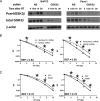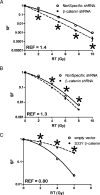GSK3beta and beta-catenin modulate radiation cytotoxicity in pancreatic cancer
- PMID: 20454507
- PMCID: PMC2864473
- DOI: 10.1593/neo.92112
GSK3beta and beta-catenin modulate radiation cytotoxicity in pancreatic cancer
Abstract
Background: Knowledge of factors and mechanisms contributing to the inherent radioresistance of pancreatic cancer may improve cancer treatment. Irradiation inhibits glycogen synthase kinase 3beta (GSK3beta) by phosphorylation at serine 9. In turn, release of cytosolic membrane beta-catenin with subsequent nuclear translocation promotes survival. Both GSK3beta and beta-catenin have been implicated in cancer cell proliferation and resistance to death.
Methods: We investigated pancreatic cancer cell survival after radiation in vitro and in vivo, with a particular focus on the role of the function of the GSK3beta/beta-catenin axis.
Results: Lithium chloride, RNAi-medicated silencing of GSK3beta, or the expression of a kinase dead mutant GSK3beta resulted in radioresistance of Panc1 and BxPC3 pancreatic cancer cells. Conversely, ectopic expression of a constitutively active form of GSK3beta resulted in radiosensitization of Panc1 cells. GSK3beta silencing increased radiation-induced beta-catenin target gene expression as measured by studies of AXIN2 and LEF1 transcript levels. Western blot analysis of total and phosphorylated levels of GSK3beta and beta-catenin showed that GSK3beta inhibition resulted in stabilization of beta-catenin. Xenografts of both BxPC3 and Panc1 with targeted silencing of GSK3beta exhibited radioresistance in vivo. Silencing of beta-catenin resulted in radiosensitization, whereas a nondegradable beta-catenin construct induced radioresistance.
Conclusions: These data support the hypothesis that GSK3beta modulates the cellular response to radiation in a beta-catenin-dependent mechanism. Further understanding of this pathway may enhance the development of clinical trials combining drugs inhibiting beta-catenin activation with radiation and chemotherapy in locally advanced pancreatic cancer.
Figures






References
-
- Macdonald JS, McCoy S, Whitehead RP, Iqbal S, Wade JL, III, Giguere JK, Abbruzzese JL. A phase II study of farnesyl transferase inhibitor R115777 in pancreatic cancer: a Southwest oncology group, (SWOG 9924) study. Invest New Drugs. 2005;23:485–487. - PubMed
-
- Jones L, Ghaneh P, Humphreys M, Neoptolemos JP. The matrix metalloproteinases and their inhibitors in the treatment of pancreatic cancer. Ann N Y Acad Sci. 1999;880:288–307. - PubMed
-
- Moore MJ, Goldstein D, Hamm J, Figer A, Hecht JR, Gallinger S, Au HJ, Murawa P, Walde D, Wolff RA, et al. Erlotinib plus gemcitabine compared with gemcitabine alone in patients with advanced pancreatic cancer: a phase III trial of the National Cancer Institute of Canada Clinical Trials Group. J Clin Oncol. 2007;25:1960–1966. - PubMed
Publication types
MeSH terms
Substances
Grants and funding
LinkOut - more resources
Full Text Sources
Medical
Molecular Biology Databases
Miscellaneous
